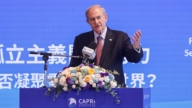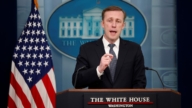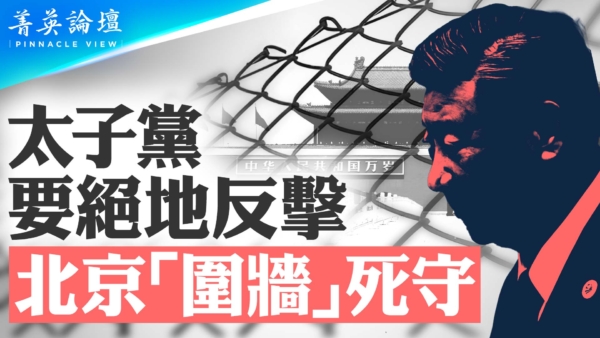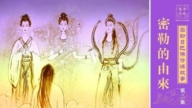【新唐人2011年9月6日讯】维基解密(WikiLeaks)近期披露美国外交电文,电文表示,中共党内有军政高层对总理温家宝不满,觉得他作风偏向自由。
“维基解密”曝光“温总理饱受批评但地位维持稳定”的密电,这是美国驻北京大使馆2009年7月发出的密电内容。内容指出,在2008年汶川大地震时,温家宝不满解放军没有及时空降灾区,军方声称不适合空降,但温家宝表示:“我就一句话,是人民在养你们,你们自己看着办。”这句话触怒军方高层。
政治经济评论家草庵居士指出,中共军方一直自成体系,不大听从国务院的指示,而受命于中央军事委员会主席。在国家体系上,是不允许从事实际工作的总理来指挥军队的。
草庵居士(政治经济评论家):“尽管国家发生了严重灾害,但是温家宝调动军队,这个中共军方就不会听从他。可以看出中共这个军队,是一个完全个人化、私有化,是党有,而不是国有,所以这是中国的一个重大的体制问题。”
电文说,一名1980年代与温家宝同在中共中央办公厅共事的官员说,温被认为“太自由”,与前上司赵紫阳有同样的改革思想和价值观,特别是政治改革。温家宝早年曾经多次在公开场合,赞赏西方推崇的自由民主等普世价值,引起中共老人不满。
外交密电引述中国社科院学者的话说, 2009年3月全国人大会议举行时,全国人大委员长吴邦国在讲话中罕有的指出,中国政治不可照搬西方那一套,加上不少中共高层批评西方政治制度,以及《北京日报》等党媒发表评论,公开批评“普世价值”,矛头都是指向温家宝。
时事评论家伍凡表示,温家宝和赵紫阳有不同之处。
伍凡(时事评论家):“赵紫阳不错,要进行政治改革,他的政治改革,为了维护共产党的稳定、利益,加强共产党的统治。但是温家宝现在讲,要出普世价值了,那就不完全是为了共产党了。但是他有没有能力做到这一步,是个大问号。”
电文又说,温家宝被前总理朱镕基质疑没有能力治理经济。此外,温家宝也曾与中共广东省委书记汪洋在产业转型步伐方面出现争执。电文引述一名中国社科院学者的话证实温、汪之间在经济政策上确有矛盾。
2008年爆发世界金融危机后,大陆特别是珠三角不少工厂倒闭,大量工人失业,温家宝要求广东暂缓“腾笼换鸟,产业升级”计划,以减少社会动荡,但被汪洋拒绝。
草庵居士认为,汪洋的路线和胡锦涛比较接近,和温家宝有一定差距,在现行体制下,温家宝遇到很大困难。
草庵居士:“因为中国实行了内阁制,名义上权力都在胡锦涛手中,但是他不负任何责任。而具体工作都要由温家宝去做。就是说他想做的事情可能没办法做到,但是他要承担很多的责任。”
不过电文指出,虽然温家宝在治理经济上受到批评,但当时的结论没有动摇他的总理职位。外界评论也表示,虽然权力可能被渐渐削弱,但温家宝应该可以做到2013年3月任期届满。
草庵居士:“中国是一个很复杂的国情。中国是中共来独裁统治,所以出现这些情况实际上是一点也不奇怪的。真正要改变中国,还是需要中国进行整体政治体制改革。”
《苹果日报》5号在评论文章《温家宝还可说可做多少事?》中说:“中国现行的政治体制,温家宝所掌控的人脉,都决定了他无法推动中国民主选举的突破。但在明年中共十八大卸任政治局常委之前,甚至在 2013年宣读最后一份政府工作报告之际,他还是有权、有责去说一些话、做一些事。”
新唐人记者周玉林、尚燕、张健综合报导。
WikiLeaks: Premier Wen’s Internal Struggles
WikiLeaks recently revealed a U.S. government cable,
showing some high ranking Chinese government
and military officials were dissatisfied
with Premier Wen Jiabao for his pro-freedom style.
The confidential cable, entitled “Premier Wen is under
widespread criticism but maintains a stable status,”
that WikiLeaks disclosed was sent by
the U.S. Embassy in Beijing in July 2009.
It shows that Wen Jiabao was discontent with the PLA’s
delay in dispatching airborne soldiers
to the Wenchuan earthquake area for adverse weather.
Wen said: “I only have one sentence to say:
It is the people who keep you fed, so do as you see
appropriate.” This has angered military high levels.
Political and economic commentator Cao’an Jushi says
that Chinese military is a self-contained system
that does not really listen to the State Council,
but abides by the orders from the military committee
of the Chinese Communist Party (CCP). In China,
the Premier is not allowed to command the armed forces.
Cao’an Jushi: “Despite the severe national calamity, CCP’s
military still do not obey Premier Wen Jiabao’s orders.
It can be seen that the army forces in China are personalized
and tamed, and belong only to the Party, not the nation.
This is a serious problem in the Chinese system.”
The cable quoted an official working with Wen Jiabao
in the CCP’s central office in the 1980’s
by saying that Wen was regarded as “too liberal”
for his thoughts and values for reform,
especially political, as his former superior Zhao Ziyang.
Wen Jiabao has acknowledged the Western freedom
and democracy on many public occasions,
which aroused dissatisfactions from the CCP’s old factions.
The cable quoted a scholar from the Chinese Academy
of Social Sciences (CASS),
who said that in March, at the 2009 National People’s
Congress (NPC) meetings, NPC chairman Wu Bangguo
rarely pointed out in his speech that China does not intend
to copy the Western system.
Many CCP high levels criticize the Western political system.
CCP mouthpieces like Beijing Daily published editorials to
openly criticize the “universal values,” aimed at Wen Jiabao.
Political commentator Wu Fan says that there is a difference
between Wen Jiabao and Zhao Ziyang.
Wu Fan: “It is true that Zhao Ziyang wanted to carry out
political reform, but his reform aimed at maintaining stability,
interests and governance of the CCP. But Wen Jiabao talks
about the universal values, which is not for the CCP only.
However, it is still questionable
whether he is able to implement it.”
The cable also said that Wen Jiabao was questioned by
ex-Premier Zhu Rongji for his inability to rectify the economy.
Wen Jiabao was once in dispute with Guangdong Party
Secretary Wang Yang on the enterprise transformation’s pace.
The cable quoted a scholar from CASS verifying that Wen
was indeed at odds with Wang on economic policies.
After the outbreak of the worldwide economic crisis in 2008,
many factories in China, especially in Guangdong province,
were closed, with a large number of workers unemployed.
Wen Jiabao requested that Guangdong suspends its plan
to transform and upgrade its enterprises
in order to alleviate social upheaval,
but was refused by Guangdong’s CCP Secretary Wang Yang.
Cao’an Jushi believes that Wang Yang’s policy nears
Hu Jintao’s, but is at a distance from Wen Jiabao’s,
so Wen has met with a significant difficulty
in the current political system.
Cao’an Jushi: “The Chinese government has implemented
the cabinet system, so superficially all powers
are in Hu Jintao’s hands, but in fact, he is not in charge at all.
The actual tasks are performed by Wen Jiabao.
However, Wen cannot do everything at his own will,
but he has to shoulder all the responsibilities.”
The cable also pointed out that despite the criticism
of his handling of the economy,
conclusions at that time did not shake his status as a premier.
Analysts believe his power may have gradually weakened,
but Wen should be able to complete his term till March 2013.
Cao’an Jushi: “China has a complicated state as a country.
Since the CCP is ruling China now,
it is not surprising at all for China to run into these problems.
To truly change China, a political reform
throughout China is necessary.”
In its September 5 editorial, titled “How many words
and things can Wen Jiabao still say or do?” Apple Daily said:
“The current Chinese political system,
and the personnel connections Wen Jiabao can control,
all determine that he is unable to garner a breakthrough
in democratic election in China.
Before he retires from the Politburo in the 18th Congress
next year, or reads his last government work report in 2013,
he still has the power and the responsibility
to say or do something.”
NTD reporters Zhou Yulin, Shang Yan and Zhang Jian































